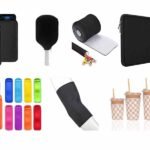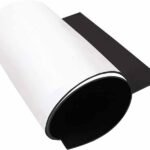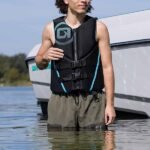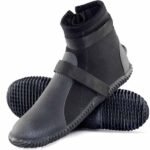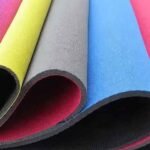Imagine this: You’re standing on a frozen lake, waiting for a bite. The wind cuts through your jacket, and your fingers start to go numb. You try to grab your fishing rod, but your grip is weak from the cold. You realize that your gloves are not doing their job. Do you need waterproof gloves, insulated ones, or both?
Choosing the right neoprene gloves for ice fishing is not just about comfort—it’s about safety. The wrong gloves can leave your hands wet, frozen, and useless. The right ones keep your hands dry, warm, and ready to reel in a big catch. Let’s break down everything you need to know about waterproof and insulated neoprene gloves, so you can make the best choice for your next ice fishing trip.
What Is The Best Material For Fishing Gloves?
Not all gloves are made for fishing, especially in extreme cold. The best materials must provide warmth, flexibility, and durability. Here’s a comparison of the most common materials used for fishing gloves:
| Material | Waterproof | Insulated | Flexibility | Durability |
|---|---|---|---|---|
| Neoprene | Yes | Yes | High | High |
| Fleece | No | Yes | Medium | Low |
| Leather | No | No | Medium | High |
| Wool | No | Yes | Low | Low |
| Rubber-Coated | Yes | No | Low | Medium |
Neoprene is the best choice because it is both waterproof and insulated. It also allows good movement, which is important when handling fishing gear.
Are Neoprene Gloves Good For Fishing?
Yes, neoprene gloves are one of the best choices for fishing. Here’s why:
- Waterproof Protection – Neoprene does not absorb water, keeping hands dry in wet conditions.
- Insulation – It traps body heat, preventing hands from freezing.
- Flexibility – Unlike thick insulated gloves, neoprene allows easy movement for tying hooks and handling fish.
- Durability – It resists wear and tear, making it perfect for rough conditions.
- Grip – Many neoprene gloves have textured palms for a better hold on wet surfaces.
For ice fishing, both waterproof and insulated neoprene gloves offer advantages, but choosing the right type depends on your needs.
What Makes Ice Fishing Gloves Different From Regular Cold-Weather Gloves?
Ice fishing gloves are designed to handle extreme cold, wet conditions, and prolonged exposure to ice. Here’s how they differ from regular winter gloves:
| Feature | Ice Fishing Gloves | Regular Cold-Weather Gloves |
|---|---|---|
| Waterproof | Yes | Sometimes |
| Insulated | Yes | Yes |
| Dexterity | High | Medium |
| Grip | Enhanced | Standard |
| Durability | High | Medium |
| Windproof | Yes | Sometimes |
Ice fishing gloves are not just about warmth. They must also prevent water from soaking through, as wet hands can quickly lead to frostbite.
How Do Waterproof Neoprene Gloves Prevent Hypothermia In Ice Fishing?
Hypothermia occurs when the body loses heat faster than it can produce it. Wet hands can speed up this process. Waterproof neoprene gloves help prevent hypothermia by:
- Sealing Out Water – No moisture means no added cold.
- Trapping Heat – The closed-cell neoprene structure locks in warmth.
- Blocking Wind – Wind can pull heat from wet skin, but neoprene provides a barrier.
- Allowing Movement – Stiff fingers get cold faster. Neoprene allows flexibility, keeping blood flowing to hands.
Without proper gloves, prolonged exposure to icy water can numb fingers, making it impossible to handle fishing gear safely.
What Thermal Technologies Define High-Performance Insulated Gloves?
Not all insulated gloves are the same. High-performance insulated gloves use advanced materials and technology to maximize warmth:
- Thermal Reflective Linings – Reflects body heat back into the glove.
- Multi-Layer Insulation – Traps heat while maintaining flexibility.
- Breathable Membranes – Prevents sweating inside the glove, keeping hands dry.
- Adjustable Wrist Seals – Locks out cold air and water.
- Fleece or Wool Linings – Adds extra warmth without bulk.
These technologies make insulated gloves more effective in extreme conditions.
Which Factors Degrade Glove Performance In Sub-Zero Temperatures?
Even the best gloves can fail under extreme cold if certain factors are not considered:
- Moisture Inside The Glove – Sweat or leaks can freeze, making gloves ineffective.
- Improper Fit – Gloves that are too tight reduce circulation, causing hands to get cold.
- Thickness Vs. Dexterity Trade-Off – Thick gloves may keep hands warm but reduce movement.
- Worn-Out Seals Or Stitching – Can allow water or cold air to seep in.
- Lack Of Layering – Some gloves need liners for extra warmth.
Waterproof Vs Insulated Neoprene Gloves: Which Glove Offers Better Protection Against Freezing Water And Snow?
Each type of glove has strengths and weaknesses:
| Feature | Waterproof Neoprene Gloves | Insulated Neoprene Gloves |
|---|---|---|
| Water Resistance | Excellent | Good |
| Warmth | Moderate | High |
| Dexterity | High | Moderate |
| Best For | Wet conditions | Extremely cold conditions |
For ice fishing, the best choice often depends on how long you’ll be exposed to cold water and whether you need maximum warmth or more flexibility.
How To Choose The Right Neoprene Gloves For Ice Fishing?
When selecting neoprene gloves for ice fishing, consider these factors:
- Waterproofing – Ensure they are fully sealed to prevent water from entering.
- Insulation Level – Choose the right thickness based on expected temperatures.
- Dexterity Needs – If handling small gear, thinner gloves with good grip are ideal.
- Grip Texture – A textured surface helps prevent slipping on wet surfaces.
- Cuff Design – Extended cuffs keep snow and cold air out.
- Layering Compatibility – Some gloves allow for additional liners for extra warmth.
If you want warmth, insulation is key. If you want dry hands, waterproofing is essential. The best gloves offer both.
Conclusion: Get The Best Custom Neoprene Gloves From Szoneier
Choosing between waterproof and insulated neoprene gloves depends on your fishing conditions.
- Wet environments: Prioritize waterproof gloves.
- Extreme cold: Opt for insulated gloves.
- Ultimate performance: Combine both features.
At Szoneier, we manufacture high-quality custom neoprene gloves for brands, wholesalers, and retailers in Europe and the USA. Our gloves offer the best combination of:
- Waterproof protection
- Advanced insulation
- Industry-leading durability
- Ergonomic comfort
Looking for the perfect neoprene gloves for your business?







